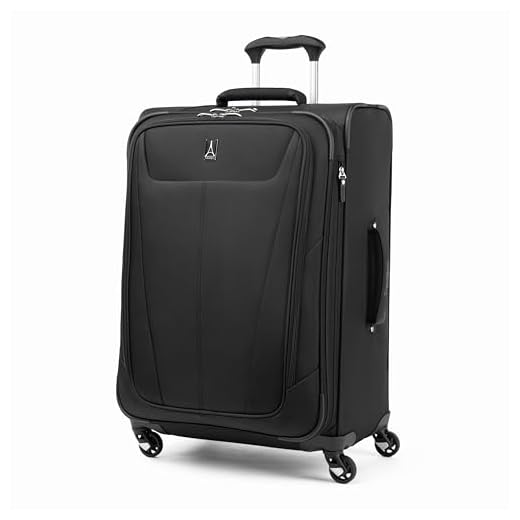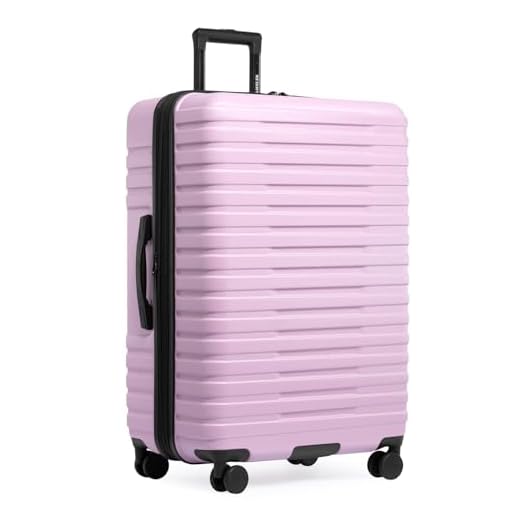

Travelers must adhere to specific weight and dimension limits imposed by various carriers. Typically, maximum weight allowances range from 50 to 70 pounds (23 to 32 kg), while linear dimensions (length + width + height) usually should not exceed 62 inches (158 cm). Exceeding these limits often incurs additional fees.
Consider pre-packing and weighing items before arriving at the airport. Personal scales can help ensure compliance with airline requirements. If you anticipate carrying bulky items, review individual airline policies, as some may allow exceptions or offer premium services for sporting equipment or musical instruments.
Checking the number of pieces also matters; most airlines permit one or two bags, with potential fees for additional units. Ensure familiarity with specific guidelines provided on airline websites, as regulations can differ widely.
Weight Restrictions for Checked Baggage by Airline
Most carriers impose a maximum weight limit of 50 pounds (23 kg) for Standard Economy-class travelers on international routes. Carriers such as British Airways and Lufthansa maintain this standard, although variations exist for specific classes. Premium classes may allow weights up to 70 pounds (32 kg).
Low-cost companies typically enforce stricter rules. Ryanair and EasyJet usually cap weights as low as 44 pounds (20 kg) for standard fares. Passengers are encouraged to verify the specific guidelines on the airline’s website prior to travel.
Exceeding weight norms often results in fees, which can range dramatically: approximately $50 to $100 per overweight item, heavily dependent on the airline. Some providers may refuse to transport overly heavy items altogether.
Always weigh your items before arriving at the airport. Portable luggage scales are a practical investment. Organizing weight distribution across multiple bags may also facilitate compliance.
Keep in mind that sports equipment and musical instruments may have specialized regulations. Some providers may count them as part of the standard allowance, while others may suggest separate fees.
Duplicate weight allowances exist for certain frequent-flyer programs, allowing travelers who belong to elite tiers to carry heavier items without incurring further charges. Always check your tier benefits to understand your privileges.
Size Limitations: Dimensions for Checked Bags
Dimensions for registered suitcases typically can’t exceed 62 inches (length + width + height) in total. Each airline may have specific requirements, so verifying with the carrier is advisable before packing.
Standard sizes often include restrictions such as 27-32 inches in height, with width and depth not exceeding 15-20 inches. Compact options cater to budget travelers or those aiming to minimize costs on baggage fees.
Unique items, such as oversized sports equipment or musical instruments, might necessitate separate handling or special consideration. If transporting specific gear, checking guidelines well in advance is essential.
Reviewing policies may provide insights into handling fees and recommendations for packing efficiently. Additionally, ensuring no item exceeds size limits can prevent unexpected costs at the airport.
For further related tips, consider reading about the best silver umbrella skullgirls, or check if drones are allowed in nyc when planning your travels.
Prohibited Items in Checked Luggage
Flammable substances, including lighter fluid and fireworks, cannot be placed in your bag. Chemical agents such as bleach or any corrosive materials are also strictly forbidden.
Explosives, ammunition, and any kind of firearms must be declared and appropriately packed, but generally are not allowed in the cargo area unless following strict regulations.
Sharp objects including knives, scissors, and ice picks should remain out of your checked items. Keep tools like hammers or chisels at home as they are not permitted either.
Perishable food items can spoil and create issues; hence, they should be avoided. Additionally, fresh fruits or vegetables may be restricted based on certain regulations.
Items containing lithium batteries, such as certain electronic devices, are subject to restrictions. Ensure proper packaging to prevent any battery-related incidents.
While luxury items are often secure, be cautious with valuable possessions. It’s advisable to carry jewelry, important documents, or large sums of money in your carry-on.
Consult your carrier’s specific guidelines, as there may be variations in prohibited items across different airlines. Always check regulations before your travel date for peace of mind.
Fees and Charges for Exceeding Baggage Limits
Exceeding weight or dimension restrictions can lead to additional expenses. Airlines typically impose fees based on the amount by which limits are surpassed.
Common Fee Structures
These charges may vary significantly across carriers, but here are some common approaches:
- Weight-based Fees: Often calculated per kilogram or pound over the limit. Rates may vary based on the flight route.
- Per Bag Charges: Airlines may apply a flat fee for each additional bag beyond the permitted number, regardless of weight.
- Oversized Baggage Fees: If dimensions exceed allowable sizes, an additional fee is typically charged, irrespective of weight.
Average Cost Examples
While fees fluctuate, here are some estimated costs:
- $50 – $100 for an extra checked item.
- $100 – $200 for luggage weighing significantly above the allowed amount.
- $100 or more for overweight items that also breach size limits.
It’s prudent to check your specific carrier’s guideline for accurate fee information. Consider investing in appropriate baggage options like the best luggage for suits and dresses to minimize extra costs.
FAQ:
What are the typical weight limits for checked baggage on airlines?
Most airlines have a weight limit for checked baggage that typically ranges from 20 kg (44 lbs) to 32 kg (70 lbs) per bag. It’s important to check with the specific airline as these limits can vary based on the route, class of service, and the airline’s policy. For international flights, the limits are often higher than for domestic flights. Exceeding the weight limit can result in additional fees, so weighing your bags before heading to the airport is advisable.
Are there restrictions on the size of checked baggage?
Yes, airlines usually have size restrictions for checked baggage, commonly measuring the total dimensions (length + width + height). This total is often limited to around 158 cm (62 inches) for most carriers. However, some airlines may have different size allowances, especially for international flights or specific destinations. Oversized bags may incur extra fees or may not be accepted at all, so it’s wise to verify the size regulations with your airline in advance.
Can I check more than one bag, and are there fees associated with it?
Most airlines allow passengers to check multiple bags, but this often comes with additional fees. Depending on your ticket class and frequent flyer status, you may get a certain number of bags included in your fare. For example, economy class might include one checked bag, while business class may allow two. Additional bags typically incur a per-bag fee, which can vary widely by airline, so it’s beneficial to check the airline’s baggage policy prior to travel.
What items are prohibited or restricted in checked luggage?
Certain items are prohibited or restricted in checked luggage for safety and security reasons. Prohibited items commonly include explosives, flammable materials, and sharp objects. Additionally, some airlines have restrictions on items like lithium batteries and liquids over specific quantities. Always check the airline’s guidelines and the Transportation Security Administration (TSA) or equivalent body in your country to ensure compliance and avoid any issues at the airport.
What should I do if my checked baggage is lost or delayed?
If your checked baggage is lost or delayed, the best course of action is to report it immediately to the airline’s baggage service at the airport. Provide them with your baggage claim ticket and any relevant details about your luggage. Most airlines have a process for tracking and compensating for lost luggage, so ask for a reference number for follow-up. It’s also a good idea to keep essential items in your carry-on bag, just in case your checked luggage is delayed.







